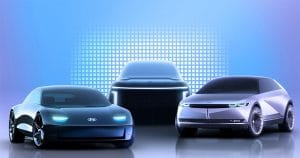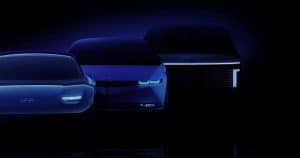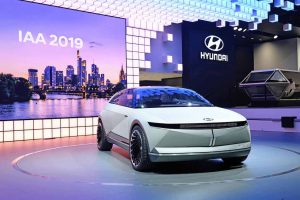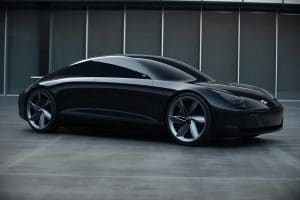As part of its goal to rapidly accelerate sales of battery cars, Hyundai is launching a new sub-brand, Ioniq, which takes its name from one of its current battery offerings.
Ioniq will debut early next year, the Korean carmaker said, with a compact sedan to be called the Ioniq 5. That will be followed by two other models, the Ioniq 6 sedan coming a year later, and an SUV to be called the Ioniq 7 coming in early 2024.
The IONIQ brand will change the paradigm of EV customer experience,” said Wonhong Cho, Executive Vice President and Global Chief Marketing Officer at Hyundai Motor Company. “With a new emphasis on connected living, we will offer electrified experiences integral to an eco-friendly lifestyle.”
Hyundai already offers a mix of electrified models, including both an all-electric version of its compact Kona SUV, as well as different variations of the Ioniq model, including a plug-in and a pure BEV. It also markets a hydrogen fuel-cell vehicle, the Nexo.
(Hyundai partnering with EV maker Canoo on future battery-cars.)
Collectively, the Hyundai Motor Group – which currently includes the Hyundai, Kia and Genesis brands — plans to spend 104 trillion Korean won, or around $87 billion, during the next five years on the development of both electric and autonomous vehicles, EVs expected to take the lion’s share of that investment. There will be an assortment of different products coming, from conventional hybrids to all-electric models, as well as hydrogen-electric products following up on the current Nexo.
By 2025, the company has announced, it has a goal of selling one million battery-electric vehicles.
Considering the relatively limited number of models that the Ioniq brand is set to offer, it is unclear whether there will be a long-term future for the electric vehicles sold under the conventional Hyundai brand, such as the Kona EV, once Ioniq debuts. At least for the near-term, the three existing Hyundai models, a regular hybrid, a plug-in and a BEV, will remain in the line-up.
While a rendering of the first three Ioniq brand models was released, there is a dearth of details about the individual models. What appears to be the case is that the first new offering, the Ioniq 5, will be based on the sharply angled Hyundai 45 concept vehicle that was unveiled at the Frankfurt Motor Show last autumn. The name was said to refer to both the sharp, 45-degree angles of its exterior, as well as the 45 years since Hyundai introduced its first global vehicle, the Pony.
“IONIQ 5’s designers took inspiration from the past and integrated it with cutting-edge parametric pixels, a unique design element that Hyundai designers will continue to incorporate into future IONIQ models,” Hyundai said in a new statement.
As for the Hyundai 6 coming in 2022, it adopts a distinctly different design language, its rounded, coupe-like sedan body directly influenced by the Hyundai Prophecy concept.
(Click Here for a closer look at the Hyundai Prophecy.)
The Hyundai 5 and 6 models appear to be taking aim at the likes of the Tesla Models Y and 3, respectively, as well as other new EV offerings, such as the Ford Mustang Mach-E and the Volkswagen ID.4,
The Ioniq 7, however, will be a larger crossover, with no direct link to any existing concept or production model.
All three of the planned Ioniq models will share the same new, dedicated EV platform, dubbed the E-GMP. As most competitors are now opting for, that flexible architecture will see batteries and motors mounted below the load floor in a skateboard-like chassis. The approach will not only lower the center of gravity but free up space normally dedicated to the engine compartment, translating into roomy passenger compartments.
Though Hyundai is not offering details on the E-GMP’s electrical system, there have been reports suggesting it will adopt an 800-volt architecture that allows for extremely fast charging using the latest 350 kilowatt chargers – with as much as 80% of a 300-mile battery pack in under half an hour. In keeping with the latest general trend among EV manufacturers, 300 miles is considered the likely target for the new Ioniq models, though they may also be offered with multiple battery pack options.
To mark the debut of the new sub-brand, Hyundai added some extra lights to the iconic London Eye ferris wheel over the weekend, turning it into a massive letter “Q.”
It remains to be seen if the new Ioniq brand will have sole purview for all future Hyundai BEVs, and the automaker isn’t saying whether it might also be used for hydrogen cars to follow the Nexo.
A number of additional battery-electric vehicles will follow through the Genesis and Kia brands, TheDetroitBureau.com last month reporting on the Imagine BEV set to become a flagship of the latter marque.
(Kia Imagine, an all-electric SUV flagship, caught in testing.)




